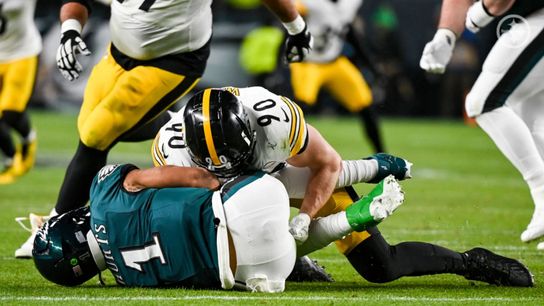The Pittsburgh Steelers have had a particularly active offseason and free agency period, with a variety of compelling storylines that have captured the attention of fans and analysts alike. While numerous topics have vied for prominence in the headlines, the most significant and widely discussed narrative undoubtedly revolves around the vacancy at the starting quarterback position. Veteran quarterback Aaron Rodgers has overwhelmingly dominated this particular area of speculation, emerging as the primary focus of rumors surrounding the Steelers' quarterback need. However, a significant amount of attention has been directed toward the team's existing roster, with crucial contract negotiations currently underway that could have substantial implications for the Steelers' long-term future and the composition of their roster in the seasons to come.

Karl Roser / Pittsburgh Steelers
Steelers' TJ Watt.
Among the key players currently involved in contract negotiations is TJ Watt, a highly respected captain and one of the undisputed stars of the team's defense. The absence of a finalized new contract for Watt at this point has unfortunately led to concerns that the situation could potentially be moving in a poor direction. It appears that some of the challenges surrounding Watt's contract negotiations might extend beyond internal discussions within the Steelers' organization.
According to a recent report by Ray Fittipaldo, a writer for the Pittsburgh Post-Gazette, a significant factor contributing to the delay in reaching an agreement with Watt could be linked to the contract situation of a prominent player on one of the Steelers' AFC North divisional rivals. Fittipaldo's article suggests that the lucrative contract extension recently signed by this rival player may have inadvertently complicated the negotiations with Watt.
"The [Myles] Garrett deal isn’t just bad business for the Browns. It’s bad news for the Steelers, who have to deal with the fallout," Fittipaldo wrote.
Fittipaldo's insights point towards the recent contract extension secured by Myles Garrett, the star edge rusher for the Cleveland Browns, as a significant factor influencing the stalled negotiations with Watt. This groundbreaking deal for Garrett not only made headlines across the league, but also established him as the highest-paid defensive player in the NFL, surpassing the previous benchmark by a notable $5 million annually.
Prior to Garrett's extension, the title of highest-paid edge rusher belonged to Maxx Crosby of the Las Vegas Raiders, who had also inked a new substantial deal that was a three-year contract worth $106.5 million just three days prior. Interestingly, reports had previously surfaced suggesting that Garrett had expressed a desire for a trade away from the Browns initially this offseason; however, instead of a change of scenery, he ultimately agreed to a lucrative four-year contract extension valued at $160 million, solidifying his future in Cleveland and significantly reshaping the landscape of defensive player salaries in the NFL.

Matt Durisko / ap photo
Steelers' TJ Watt meets with Browns' Myles Garrett after a game.
The NFL's salary cap has seen significant growth over the years, a trend that naturally influences the financial expectations of the league's top players. While the increasing salary cap provides teams with more financial flexibility, it doesn't necessarily mean universal agreement on the escalating prices demanded by the league's elite talent. Fittipaldo acknowledges the reality of this expanding salary cap, but implies it doesn't automatically justify the ever-rising contracts. With Garrett's recent extension establishing a new benchmark for top-tier edge rushers, the Steelers face direct pressure in their negotiations with Watt. To retain their star pass rusher, the organization must now seriously consider matching the current market value, while also accounting for Watt's exceptional skills and consistent high level of performance.
"Sure, the salary cap has increased in the past four years, but paying defensive players quarterback money makes no sense," Fittipaldo shared.
Throughout their respective careers in the NFL, Watt and Garrett, both premier pass rushers in the league, have frequently been the subject of comparisons, often with statistical evidence suggesting Watt has demonstrated superior overall production. Examining their career statistics, Watt holds an advantage over Garrett in several key categories, including total sacks (108 compared to 102), significantly more forced fumbles (33 versus 20), a greater number of fumble recoveries (12 compared to 6), and remarkably, has also recorded interceptions (7) while Garrett has none.
Interestingly, despite these statistical differences favoring Watt, both players have achieved an equal level of recognition in terms of accolades, each earning six Pro Bowl selections and both having been honored with the prestigious NFL Defensive Player of the Year Award on one occasion. This statistical disparity coupled with equal recognition underscores the nuanced ways in which their individual impacts and overall value to their respective teams are perceived and measured.

Taylor Ollason / Pittsburgh Steelers
Steelers' TJ Watt causes a turnover on Eagles' Jalen Hurts during a Week 15 matchup in Philadelphia, PA.
Building upon the statistical comparison between Watt and Garrett, Fittipaldo proceeded to express his skepticism regarding the substantial contract awarded to Garrett, particularly with the career statistics that seemingly favor Watt's overall impact. Fittipaldo's line of questioning extended to the broader implications of Garrett's record-setting deal, pondering how such a significant contract for a top-tier edge rusher might reshape the financial landscape and influence the future contract negotiations for other elite defensive players across the NFL.
"Watt deserves to be paid more than Garrett, but why should the Steelers allow the Browns to set the market with a bloated contract?" Fittipaldo asked.
Does This Mean The Steelers Are Ready To Move On From Watt?
It's important to understand that just because contract talks are complicated right now, it doesn't mean for sure that Watt won't sign a new deal with the Steelers in the near future. Nothing is truly finalized and binding until the contract is officially signed and executed. Despite the challenges presented by the recent high-value contracts awarded to other elite defensive players, including Garrett, there have been ongoing discussions and reports suggesting that the Steelers organization maintains a genuine desire to re-sign Watt.

Lake Fong / Post-Gazette
The Pittsburgh Steelers welcome T.J. Watt (middle), shown with Head Coach Mike Tomlin (left) and Team President Art Rooney II (right) back in 2017.
However, these precedent-setting deals undeniably add additional layers of complexity to the negotiation process, potentially influencing the financial expectations on both sides and requiring careful consideration as the Steelers strive to secure Watt's long-term future with the team while also managing their overall salary cap strategy.
Do you want to see the Steelers re-sign Watt? Let us know in the comments below!
#SteelerNation


